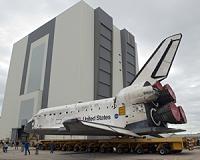 |
Huntsville AL (SPX) Feb 26, 2010 NASA's Space Shuttle Program conducted the final test firing of a reusable solid rocket motor Feb. 25 in Promontory, Utah. The flight support motor, or FSM-17, burned for approximately 123 seconds - the same time each reusable solid rocket motor burns during an actual space shuttle launch. Preliminary indications show all test objectives were met. After final test data are analyzed, results for each objective will be published in a NASA report. ATK Launch Systems, a unit of Alliant Techsystems Inc., in Promontory, north of Salt Lake City, manufactures and tests the solid rocket motors. The test - the 52nd conducted for NASA by ATK - marks the closure of a test program that has spanned more than three decades. The first test was in July 1977. The ATK-built motors have successfully launched the space shuttle into orbit 129 times. "The test was a great deal more than the successful conclusion to a series of highly successful NASA/ATK-sponsored static tests that began more than three decades ago," said David Beaman, Reusable Solid Rocket Booster project manager at NASA's Marshall Space Flight Center in Huntsville, Ala. The project, part of the Space Shuttle Propulsion Office, is responsible for motor design, development, manufacturing, assembly, testing and flight performance. "These tests have built a base of engineering knowledge that continued engineering development of the reusable solid rocket motor system and the continued safe and successful launch of space shuttles," Beaman said. "They have provided an engineering model and lessons learned for additional applications in future launch systems." The final test was conducted to ensure the safe flight of the four remaining space shuttle missions. A total of 43 design objectives were measured through 258 instrument channels during the two-minute static firing. The flight motor tested represents motors that will be used for all remaining space shuttle launches. The space shuttle's reusable solid rocket motor is the largest solid rocket motor ever flown, the only one rated for human flight and the first designed for reuse. Each shuttle launch requires the boost of two reusable solid rocket motors to lift the 4.5-million-pound shuttle vehicle. During space shuttle flights, solid rocket motors provide 80 percent of the thrust during the first two minutes of flight. Each motor, the primary component of the shuttle's twin solid rocket boosters, generates an average thrust of 2.6 million pounds and is just over 126 feet long and 12 feet in diameter.
Share This Article With Planet Earth
Related Links Shuttle at NASA Shuttle at NASA Watch NASA TV via Space.TV Space Shuttle News at Space-Travel.Com
 Discovery Being Prepped For Rollout
Discovery Being Prepped For RolloutCape Canaveral FL (SPX) Feb 24, 2010 Space shuttle Discovery will be attached to its external fuel tank and twin solid rocket boosters today in NASA Kennedy Space Center's Vehicle Assembly Building. The shuttle is being prepared for its rollout to Launch Pad 39A, scheduled for March 2 at 12:01 a.m. EST. At NASA's Johnson Space Center in Houston, Discovery's STS-131 crew members will be reviewing administrative and Multi-Purpo ... read more |
|
| The content herein, unless otherwise known to be public domain, are Copyright 1995-2010 - SpaceDaily. AFP and UPI Wire Stories are copyright Agence France-Presse and United Press International. ESA Portal Reports are copyright European Space Agency. All NASA sourced material is public domain. Additional copyrights may apply in whole or part to other bona fide parties. Advertising does not imply endorsement,agreement or approval of any opinions, statements or information provided by SpaceDaily on any Web page published or hosted by SpaceDaily. Privacy Statement |